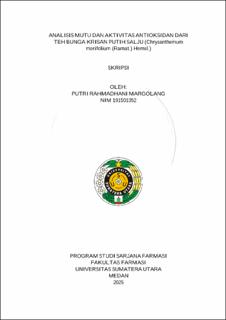| dc.description.abstract | Background: Snow white chrysanthemum flowers (Chrysanthemum morifolium
(Ramat.) Hemsl.) are used in medicine as well as a popular drink. This flower
contains phenolic compounds and antioxidants that support health. Even though
chrysanthemum flowers are well known in Indonesia, their use as a daily functional
food is still not optimal.
Objective: To determine the quality and antioxidant activity of snow white
chrysanthemum flower tea (Chrysanthemum morifolium (Ramat.) Hemsl.).
Method: This research is an experimental study involving chemical,
microbiological and antioxidant activity testing of snow white chrysanthemum tea
using the 2-2 diphenyl-1 picrylhydrazyl (DPPH) method using a UV-Visible
spectrophotometer.
Results: Polyphenol content test results 5.4 mg GAE/g extract , water content
3.19%, extract content in water 32.7%, total ash content 7.97%, water soluble ash
content 45.4%, acid insoluble ash content 0.16%, water soluble ash alkalinity
2.35%, crude fiber 15.5%, cadmium (Cd) <0.04 mg/kg, lead (Pb) <0.008 mg/kg, tin
(Sn) <0.06 mg/kg, mercury (Hg) 0.000049 mg/kg, arsenic contamination (As)
0.000631 mg/kg, total plate count (ALT) 1.5x101 colonies, coliform bacteria 0
APM/g, mold <1; Inhibitory Concentration 50% (IC50) 66.0085 mg/ml.
Conclusion: Analysis of the quality of snow white chrysanthemum tea has met the
quality requirements for packaged dry tea and has strong antioxidant activity. | en_US |


